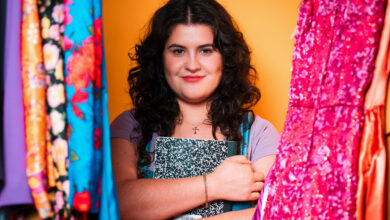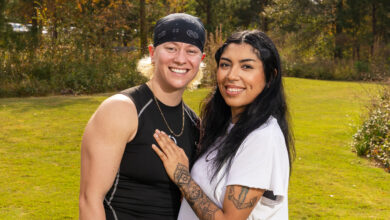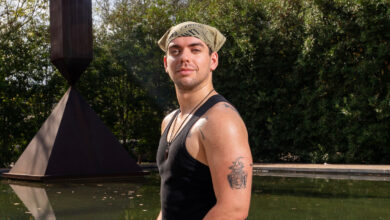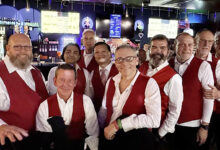
Leading from the Front: 2015 Female Pride Grand Marshal Britt Kornmann
Britt Kornmann, 2015 Female Pride Marshal, doesn’t ask others to do anything she wouldn’t do herself.
By Brandon Wolf
The year 2000 was a time of optimism for many—a new millennium was in its earliest dawn, and it seemed like any dream could be fulfilled. But for Britt Kornmann, it was the worst year of her life—the year when everything she had worked for fell apart, one thing after another.
A first-year cadet at the U.S. Air Force Academy, Kornmann was a shooting guard on the women’s basketball team and planned to become a fighter pilot. She was continuing a family legacy of Air Force service, and was excelling in her classes.
Kornmann could have entered the academy for her sports achievement, but chose instead to win the appointment based on her academic record. She endured the hazing meted out to all first-year students. Her future seemed steady as a compass. And then it all went wrong.
During a basketball scrimmage, her shoulder became dislocated. This had happened before—for years, the upper arm bone had always popped right back into her shoulder socket. Now it refused to, and Air Force surgeons only made it worse. She could no longer play on the basketball team and was ineligible to become a pilot.
Then, four female classmates were discharged from the academy on the grounds that they were lesbians. “I decided then and there that I was not going to work hard to graduate, and be discharged early like they were,” Kornmann says. She resigned from the academy at the end of her first semester, ending her dreams and a family legacy. The new millennium had crashed down on life as she knew it.
Growing Up in Kingwood
Kornmann was born in 1982 in Fairborn, Ohio. Her parents both worked in the computer unit at Wright-Patterson Air Force Base. “They started back in the punch-card era,” Kornmann says.
When she was a year old, her parents moved to Houston and settled in Kingwood. Her father began a long IT career at what was then Texas Commerce Bank (now Chase Bank). In 1984, her brother, Ryan, was born.
Kornmann spent her school years in Kingwood with the same group of classmates, moving from elementary to middle school to high school. She was a tomboy who loved basketball and golf. Academically, she was a math scholar.
“I always went home and did my homework as soon as I could,” Kornmann remembers, “because then my brother and I could go outside and shoot hoops.” Athletics and math were her two major interests. Having a boyfriend—despite her attempts to “play the game”—was not an interest.
“As I got older, I was a tomboy and a math nerd,” she says. “Other athletic girls got into the whole makeup and hairstyle thing and had boyfriends, but I just couldn’t get interested.” In typical military manner, she doesn’t complain about her life. But when asked, she admits she was lonely, and dealt with it by keeping busy. It paid off when she graduated 42nd in a class of 942 students.
Kornmann remembers Houston’s WNBA championship-winning team, the Comets. But the Comets team members who were gay were closeted, so she had no positive lesbian role models to look up to in women’s basketball. “I remember being scared of the subject,” Kornmann says. “In high school, it was rumored that two girls were lesbians, and they were bullied and ridiculed.” Even in the age of Ellen’s coming out, she was not in an environment that was accepting.
Adversity Makes You Stronger
Kornmann’s appointment to the Air Force Academy was an exciting time for her. Even the required buzz-cut was okay. She made it through the initiation and became a skilled shooter. But it was a conservative environment with strong religious overtones. The 2007 documentary For the Bible Tells Me So exposed the power that fundamentalists exert at the academy.
“Don’t Ask, Don’t Tell” was in effect, and members of the military had to play it straight. Additionally, women were a small percentage of the cadet corps, and males at the academy didn’t want any of them to be unobtainable because of sexual orientation.
When her life’s dreams toppled like dominoes, starting with the shoulder dislocation and ending with the dismissal of four classmates, Kornmann admits she fell into a deep depression. But she soldiered on.
Kornmann transferred to Southwestern University in Georgetown, Texas. Chartered in 1840, the small liberal-arts school is the oldest university in Texas. Southwestern was near Austin, and had a totally different atmosphere than she had been used to.
Basketball was out, but Kornmann was able to play lacrosse, and worked up to captaining the team. She also fell in love with the coach.
Kornmann majored in math and business, working her way through school with various jobs—as a residence advisor, a tutor, and a Starbuck’s employee. She finished in two years, graduating in late spring of 2003.
Paris Is for Lovers
After gaining her bachelor’s degree, she moved to France with her former lacrosse coach. They took up residence three blocks from the Eiffel Tower and became tour guides on bicycles. “We were given a crash course in Paris history, and then sent out with groups of tourists who peddled their way around the city.”

But the tour service was run by conservative people, so Kornmann and her lover went back into the closet. “I had fun being a tour guide,” she says, “but I needed to use my brain again.” So in 2005, Kornmann returned to the U.S. and found a job with Ameriprise Financial as a financial planner. She enjoyed working closely with clients each day, helping them plan for their futures.
Kornmann has remained with the firm for the past 10 years. She began in Austin, was transferred to Clear Lake as a manager, and then spent five years in the Woodlands branch. She now has “the perfect job”—working in the Galleria area and specializing in financial planning for LGBT clients. “It’s a wonderfully diverse office,” she says.
Wanting to Make a Difference
In 2006, Kornmann met Carol Wyatt—a former Houston Pride marshal—and became interested in the Human Rights Campaign (HRC). She was especially interested in their efforts to open up the military to LGBTs and do away with “Don’t Ask, Don’t Tell.” Her memories of the Air Force Academy made her want to right that wrong.
In 2007, Kornmann became the chair of the Ameriprise PRIDE Advisor Network, a position she still holds. She has led more than a dozen pro-bono financial planning seminars for various LGBT charities in Houston.
She also became the chair of HRC Houston’s digital communications committee, a position she exchanged to chair the membership and community events committee.
Familiar with how HRC Houston operated, she took on the challenging role of chairing the HRC Federal Club from 2009 to 2011. This group solicits pledges from $100 a month to $4,999 a year from HRC members for the legislative and advocacy work of HRC’s political action committee.
Kornmann then spent 2011–2012 as HRC’s local steering committee co-chair. Continually gaining leadership experience, she felt ready to accept the extremely important position as chair of the local Federal Club Council. The council secures pledges, starting at $5,000 a year on up to over $250,000 a year, for the HRC Foundation.
2014 found her chairing the enormous HRC Houston 17th Annual Gala, and she returned to chair this year’s gala last April.
Ready for National Leadership
After Kornmann’s leadership ability caught the eye of HRC’s national headquarters in Washington DC, she was asked to become an HRC National Federal Club Co-Chair in 2011 and 2012—and also to serve on the board of governors.
By 2012, she had reached the top, joining the board of directors of the HRC Foundation. “I still can’t believe it when I’m sitting right next to [Matthew Shepard’s mother] Judy Shepard during meetings,” she says with awe.
Locally, Kornmann has been an active volunteer, contributor, and fundraiser for numerous LGBT organizations. She has given her time and talent to AssistHers, the Victory Fund, Carol’s Holiday Party, Black Tie Houston, Legacy Community Health Services, Out & Equal, Transgender Day of Remembrance, Transgender Unity Banquet, Houston Stonewall Young Democrats, and the Houston GLBT Political Caucus.
“But there is still so much to do,” Kornmann says passionately. She is especially concerned about the high rate of homelessness among LGBT youth. She also has great concern for the transgender community. Participating for years in the Transgender Day of Remembrance has been emotional for her, as the names of those who have died from violence during the past year are read.
In 2014, Kornmann was a member of the HERO Executive Committee.
Asked what drives her involvement, Kornmann says, “The work needs to be done. I have skills that can be utilized. I want to help as best I can.”
A leader who can get things done, Kornmann believes in “leading from the front.” She explains: “This means leading by example. I lead by being on the ground, doing the work, always willing to roll up my sleeves. I’ve been fortunate that people have followed and joined in the work. I won’t ask people to do anything I’m not willing to do myself. I donate, volunteer, and do the same work I’m asking others to engage in.”
Thinking back to the two HRC galas she has chaired, Kornmann says she filled in for volunteers who didn’t show up. “You could find me sitting on the floor, putting together name-holder sets for the tables.”
Once Again, Love Comes
In 2011, Kornmann met and fell in love with HRC employee Erin Miller, and in 2014 they were married at the Jefferson Memorial with about 40 friends and family in attendance—including her parents, her uncle and his husband, and Erin’s mother and sister. Erin’s niece and nephew were the flower girl and ring bearer. Allyson Robinson, a West Point graduate prior to her gender reassignment, officiated.
Kornmann and her wife now live in the Heights in what she describes as a charming garage apartment. The structure was built in the 1920s.
Being named the 2015 Female Pride Marshal came as a surprise to Kornmann. “The other two nominees have been such hard workers in the community for so long, I was sure they would be elected,” she says.
Within days of the announcement, she and her wife flew to Washington DC to be present at the April 28 Supreme Court oral arguments in Obergefell v. Hodges, the landmark marriage equality case now before the Court.
The couple then boarded a plane and headed for Paris, Morocco, and Milan for two weeks. “I never tire of that city,” Kornmann says. She has returned every year since leaving in 2005.
When they return to Houston, they will prepare for the event-filled 2015 Houston Pride Month. On June 27, she will make history by becoming the first Female Pride Marshal to ride in the relocated downtown parade.
As their convertible makes the turn from Walker Street on to Smith Street, she and Erin will get a spectacular view of the rainbow-lit Houston City Hall. Kornmann’s mind may drift back for a moment to the days when the thought of riding through Houston, waving to a parade crowd with her legally married wife at her side, may have seemed impossible.
Brandon Wolf also writes about the male and ally Pride marshals in this issue of OutSmart.










